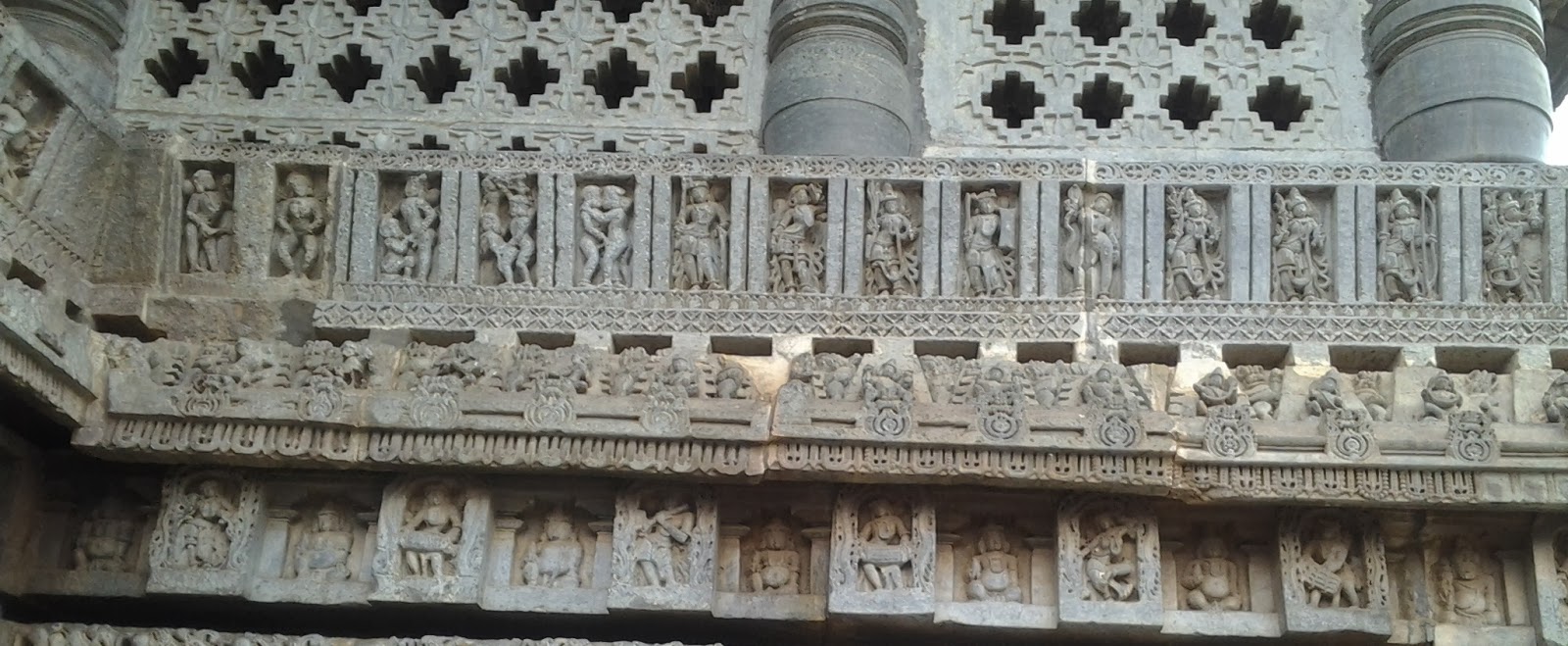Hoysaleswara Temple is situated in Halebeedu taluka in Hassan district of Karnataka. It is approx 220 km from Bangalore & 30 km from Hassan. Nearest railway stations are Hassan & Chikmaglur.
Average height of the town is 900 meters above sea-level & breezy weather is similar to Bangalore. Best time to visit is Oct - Mar when the humidity level is low. Halebeedu, Belur & nearby area is predominantly agricultural & village roads are not so good. Take care while driving.
Halebeedu or 'old city' in Kannada language was also known as Dorasamudra or Dwarasamudra as the fort there was situated near a huge water body. Halebeedu along with Belur - which is 16 km away, formed the capital of Hoysala empire in 12th century.
There are two temples Hoysaleshwara & Shantaleshwara which were financed by a wealthy landlord of that time named Ketamala. The temple complex was completed in the year 1121. The temples are attributed to prominent Hoysala King Vishnuvardhana Hoysala & his Queen Shantala. Hoyesaleshwara temple is dedicated to Lord Shiva.
There is a legend about the name Hoysala. It is said that Sala & his guru Sudatta Muni were performing a ritual in Vasantha Parmeshwari temple in nearby Sosevur & a tiger attacked them(some say it was a lion). Sudatta Muni gave a call of 'Hoye' to Sala who struck the tiger down. Thus began the Hoysala dynasty which ruled for 300 years with Sala as the first ruler. The scene of fight between Sala & the tiger has been carved in stone in several places & it became an emblem of the Hoysala Dynasty.
Of the Hoysala kings name of King Vishnuvardhana is very prominent. He was great patron of art & is said to have commissioned 1500 temples of which 100 have survived. Queen Shantala was an accomplished dancer.
The capital was ransacked by armies of Delhi Sultans led by Malik Kafur. Thereafter the capital lost the importance & fell in neglect. Some photos:
.
Average height of the town is 900 meters above sea-level & breezy weather is similar to Bangalore. Best time to visit is Oct - Mar when the humidity level is low. Halebeedu, Belur & nearby area is predominantly agricultural & village roads are not so good. Take care while driving.
Halebeedu or 'old city' in Kannada language was also known as Dorasamudra or Dwarasamudra as the fort there was situated near a huge water body. Halebeedu along with Belur - which is 16 km away, formed the capital of Hoysala empire in 12th century.
There are two temples Hoysaleshwara & Shantaleshwara which were financed by a wealthy landlord of that time named Ketamala. The temple complex was completed in the year 1121. The temples are attributed to prominent Hoysala King Vishnuvardhana Hoysala & his Queen Shantala. Hoyesaleshwara temple is dedicated to Lord Shiva.
There is a legend about the name Hoysala. It is said that Sala & his guru Sudatta Muni were performing a ritual in Vasantha Parmeshwari temple in nearby Sosevur & a tiger attacked them(some say it was a lion). Sudatta Muni gave a call of 'Hoye' to Sala who struck the tiger down. Thus began the Hoysala dynasty which ruled for 300 years with Sala as the first ruler. The scene of fight between Sala & the tiger has been carved in stone in several places & it became an emblem of the Hoysala Dynasty.
 |
| Hoyesala Emblem(This pic is from Channakesava temple Belur) |
The capital was ransacked by armies of Delhi Sultans led by Malik Kafur. Thereafter the capital lost the importance & fell in neglect. Some photos:
 |
| The temple is built with soapstone on an star shaped elevated platform 'jagati'. Towers of the temples are missing lost perhaps to the elements. |
 |
| The outer walls of the two temples have rows of exquisite & intricate sculptures |
 |
| Beautiful entrance with Dwarpals ( door keepers) in full regal attire & jewellery in intricate details. Several attempts to put arms back have gone in vain |
 |
| A row of mythical beast Makara in the middle has features of elephant, lion, crocodile, mahisha, horse & peacock. Over this is a row of Hansas (swans) |
 |
| Decorated & massive Nandi bull guarding the temple |
 |
| Lord Krishna has lifted the Govardhan. Cows along with residents have taken the shelter underneath |
 |
| A scene from Mahabharata. Fierce fight is on between Karan & Arjun |
 |
| Dancing lady with musicians |
 |
| Demon has been beheaded |
 |
| Lord Rama has shot an arrow from behind the seven trees & hit Bali |
 |
| A touch of 'mithuna' |
 |
| Stone carving of Abhimanu entering the Chakravuha |
 |
| Bhim in angry mood has finished five elephants & their mahaouts & fighting with another |
 |
| Victory of Mahishasur Mardini over the Mahishasur |


2 comments:
https://jogharshwardhan.blogspot.com/2016/10/hoysaleswara-temple-karnataka.html
Extremely beautiful and pleasing. Thanks.
Post a Comment